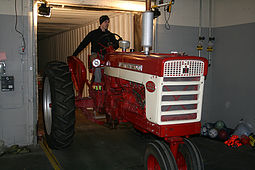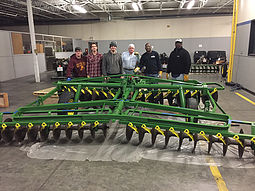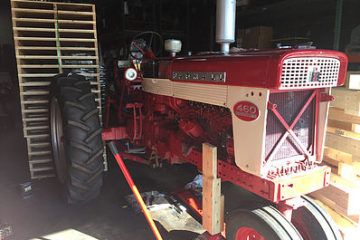One perk of leaving Burkina Faso is that one feels like the President of the United States. Ouagadougou’s airport does not have traditional gates, so everyone has the chance to climb the steps to the plane and wave at the adoring crowds and press. On June 20th, Louis Ricard and I arrived in Burkina Faso and prepared for the arrival of our first set of farm equipment. Since then, I have made countless motorcycle trips to the village of Koulga (where our tractor is based), instructed 3 people on the proper operation and maintenance of the tractor, and setup and tested a plow, disk, sprayer and row-crop cultivator. We have worked fields for over 50 farmers in the half-season that we had after the shipping and customs delays. We setup a scientific study to test the effects of our tillage equipment on yield and soil density, and we even received a ram from the villagers in appreciation!

In retrospect, we have learned a lot of lessons to use next year and in future projects. Some of these include:
Ship early – the season started on June 1st and, despite the June 4th arrival estimates, the container arrived on June 25th. That is 73 days after we shipped the container from Minneapolis.
Logistics – the farmer cooperative in Koulga has first priority to tractor labor. However, when their fields are done, we offer our services to farmers in other villages. With the small, irregularly-shaped fields here in Burkina Faso, it is possible to drive 5 km to work two fields of one acre each, then drive 5 km to do the same thing again. This is a waste of time and gas. As the season went on, we learned to coordinate with villages 1-2 weeks ahead. We tell them to sign up and, if their village amasses the number of hectares necessary to justify the gas and time, we send the tractor there.
Spreading the word – many farmers are not aware that weed removal and chemical application services are available! We are putting ads on the radio in the local Gourmanché and Mooré languages. We have also made a point to do work in a wide range of villages, and to leave a part of most fields un-worked so that people can see the difference. This is already creating excitement for next year, with farmers saving money and removing obstacles from their fields in preparation for the tractor.
Lastly, on a personal note, this experience has made me incredibly humble and grateful for the all of the support we received. Truly, this has been a chance to be a part of something bigger than myself. Our equipment is already visibly improving crop conditions and yields across the region of the East. After harvest, these families will have more food to ward off malnutrition and more money for health care and education. Literally hundreds of people have seen their lives changed for the better by our project, and all of this cost roughly the price of a new car ($26,000). Words cannot express how grateful I am to everyone who made this project possible. Whether it was making generous donations, finding and fixing equipment, painting the tractor, transporting the equipment to Minneapolis, coordinating shipping logistics or planning fundraisers, you all came through for us when we needed you most. Congratulations to all of you on a job well done! Stay tuned for more great things to come.


